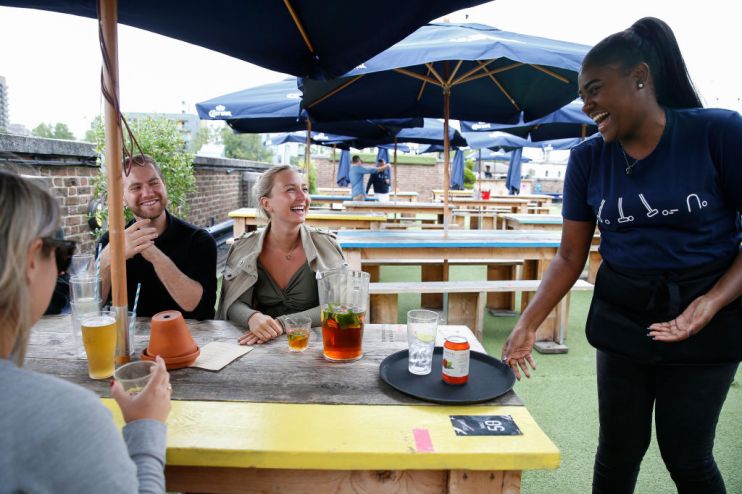Hospitality chiefs celebrate 19 July announcement but warn of long road to recovery

The hospitality industry welcomed Boris Johnson’s lockdown easing announcement this evening with open arms, but still fears the hangover from Covid-19 restrictions will damage trade.
Business owners in the industry have hailed the government decision to lift compulsory restrictions on so-called “Freedom Day”, meaning pubs, bars and restaurants will be able to operate at full capacity for the first time in 16 months.
Masks, social distancing and table service will no longer be legally required from 19 July, and limits on group numbers are also set to be lifted.
The announcement marks a “major milestone” and means that next month will be the first time since March last year that hospitality business owners can realistically look to break even and move towards profitability, chief executive of UK Hospitality Kate Nicholls said.
“This progress is testament to the constructive and positive work that we have undertaken with government, to pave the way for this timely handing over of responsibility, shifting from enforced legal requirements to an onus on personal and business responsibilities, to ensure that we continue to safeguard our staff and customers in the tried and tested ways we know work best,” she said.
Track and trace prolongs staffing issues
But Nicholls also warned that in order to make a full recovery, venues will need autonomy to act according to their own risk assessments, and a “workable” Test and Trace system that doesn’t demand the blanket self-isolation that is currently causing huge staffing issues across the industry.
Richard Burge, chief executive of London Chamber of Commerce and Industry, said that the restrictions end date was “hugely significant” for London and a “further placing of the ‘open for business’ sign on the front door.”
However, hospitality businesses in London still need to hear an update regarding the future of the Track and Trace system and self-isolation support, he said.
“Many people are still not fully vaccinated at this point, and we also cannot be complacent regarding potential emergence of variants, or indeed future viruses,” Burge added.
Ally Wolf, the manager of the Clapham Grand music venue in south London, said that his team is currently seven members of staff down due to self isolation. “If we lose one more staff member we won’t be able to open,” he said.
“We welcome the government’s decision to reopen on 19 July with open arms but we are worried we won’t actually be able to do it with an open venue if something isn’t done about the isolation policy for people that are contacted through the Track and Trace app,” he added.
Ongoing uncertainty
The PM also confirmed this evening that nightclubs and music venues that have survived the pandemic will finally be able to reopen their doors next month, and music lovers will be able to return to the dancefloor without a mask.
Measures like compulsory table service, event certification and a ban on mass events were all restrictions that had “decimated” the night time economy over the last 16 months, according to Michael Kill, CEO of the Night Time Industries Association (NITA).
But Boris Johnson’s indication that an absolute final decision on Freedom Day would be made on 12 July reinforced the doubt that the industry has about any hoped for return to normality, Kill warned.
“As we commented at the time of the last decision on restrictions, one week is simply not enough time for businesses to plan to reopen – and it betrays the sense that the Government doesn’t understand what it takes to reopen a businesses after over a year without trading,” Kill said.
Nick Mackenzie, chief executive of Greene King, said: “It’s been a difficult time for everybody but as we start to come out of this crisis and learn to live with the virus, we still need the government to support the rebuilding of the hospitality sector particularly with business rates and duty reform, as well as tackling the short term issues around recruitment after months of closure.”
Long road to recovery
The lifting of restrictions will mean that 2,000 pubs that had been forced to stay shut because they couldn’t operate under social distancing and table service only will be able to reopen, according to the British Beer & Pub Association (BBPA).
But 19 July will be “only the beginning” for the pub industry, the trade body warned.
“Having been one of the worst hit sectors by lockdown, our pubs and brewers now need the government to invest in them by reforming VAT, beer duty and business rates to reduce the unfair tax burden they face and aid their recovery,” Emma McClarkin, chief executive of BBPA, said.